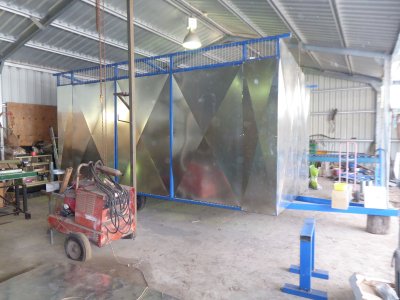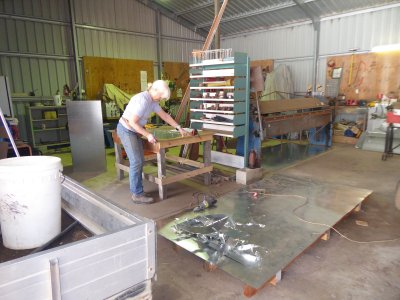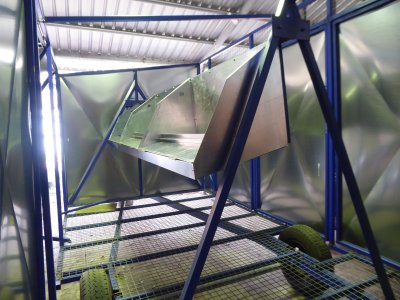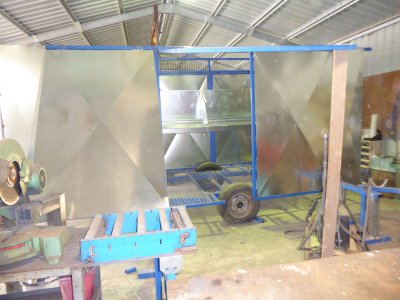wbvs58
Well-known member
I think I've educated you fellas previously as to what chooks are but for those a bit slow on the uptake and newer members, they are chickens. My daughter Jo has been looking for a base income stream so that she can give up her day job and pasture raised egg laying hens have always interested me because of the benefits to the soil and pasture but have not wanted to commit to the time and work involved with them. Well anyway it looks like I'm going to be involved.
Jo has been busy preparing our biosecurity and food safe plan to get an accreditation number so the eggs can be sold at farmers markets and specialty shops like delicatesans and fruit shops. In the meantime we have been dipping our toe in the water with 50 hens we bought from another producer and some eggs we have hatched out. I converted a small cattle box for the back of my utility into a mobile henhouse and built another portable coop.
I have now started on building the first of 3 chicken caravans. These will be, I'll talk in imperial for you people, 16'x8'x8' high on a single axle. The idea is the hens go into the caravan on dark and are let out at first light in the morning. They have a yard made of 220 yards of electrified netting to protect from foxes. Roll away nest boxes will be hung from the centre to help keep the eggs clean. The hens have to be replaced every 12 months as older hens are more prone to salmonella. Each caravan will house 300 birds and a new batch will come in 3 times a year so will be staggered for continuity of egg production. Anyhow her are a couple of photos of the start of the first one. The drawbar and chasis is complete and is on the ground. The frame on the trestles is one side with ventilation at the top.


I'm not a good welder but I am a good fabricator. I get by with my welding. I have trouble judging the depth of field with my double vision these days so try to set things up so they are level and in front of me. I have given away using galvanised steel, I think it has affected my lungs over the years. I like building things light yet strong, the steel I am using for most of the frame is 40x40 x1.6 square hollow section (11/2"x11/2"x as thin a wall thickness as it comes in). I find it is a very usefull size and have enough experience using it to not blow too many holes in it.
Anyway as things progress I'll keep updating the photos.
Some of you may remember the covered boat trailer I built for the grandkids 29er sailing skiffs I built a few years ago. It is a resounding success and I could have gone into business building boat trailers with all the people asking my daughter if I could build one for them. Maybe that is something my grandson could get into, he asked me for a welder for his 18th birthday a couple of months ago. I bought him a multi function, mig/stick/DC tig welder. He is looking to do an apprenticeship as a boilermaker next year.
Ken
Jo has been busy preparing our biosecurity and food safe plan to get an accreditation number so the eggs can be sold at farmers markets and specialty shops like delicatesans and fruit shops. In the meantime we have been dipping our toe in the water with 50 hens we bought from another producer and some eggs we have hatched out. I converted a small cattle box for the back of my utility into a mobile henhouse and built another portable coop.
I have now started on building the first of 3 chicken caravans. These will be, I'll talk in imperial for you people, 16'x8'x8' high on a single axle. The idea is the hens go into the caravan on dark and are let out at first light in the morning. They have a yard made of 220 yards of electrified netting to protect from foxes. Roll away nest boxes will be hung from the centre to help keep the eggs clean. The hens have to be replaced every 12 months as older hens are more prone to salmonella. Each caravan will house 300 birds and a new batch will come in 3 times a year so will be staggered for continuity of egg production. Anyhow her are a couple of photos of the start of the first one. The drawbar and chasis is complete and is on the ground. The frame on the trestles is one side with ventilation at the top.


I'm not a good welder but I am a good fabricator. I get by with my welding. I have trouble judging the depth of field with my double vision these days so try to set things up so they are level and in front of me. I have given away using galvanised steel, I think it has affected my lungs over the years. I like building things light yet strong, the steel I am using for most of the frame is 40x40 x1.6 square hollow section (11/2"x11/2"x as thin a wall thickness as it comes in). I find it is a very usefull size and have enough experience using it to not blow too many holes in it.
Anyway as things progress I'll keep updating the photos.
Some of you may remember the covered boat trailer I built for the grandkids 29er sailing skiffs I built a few years ago. It is a resounding success and I could have gone into business building boat trailers with all the people asking my daughter if I could build one for them. Maybe that is something my grandson could get into, he asked me for a welder for his 18th birthday a couple of months ago. I bought him a multi function, mig/stick/DC tig welder. He is looking to do an apprenticeship as a boilermaker next year.
Ken





